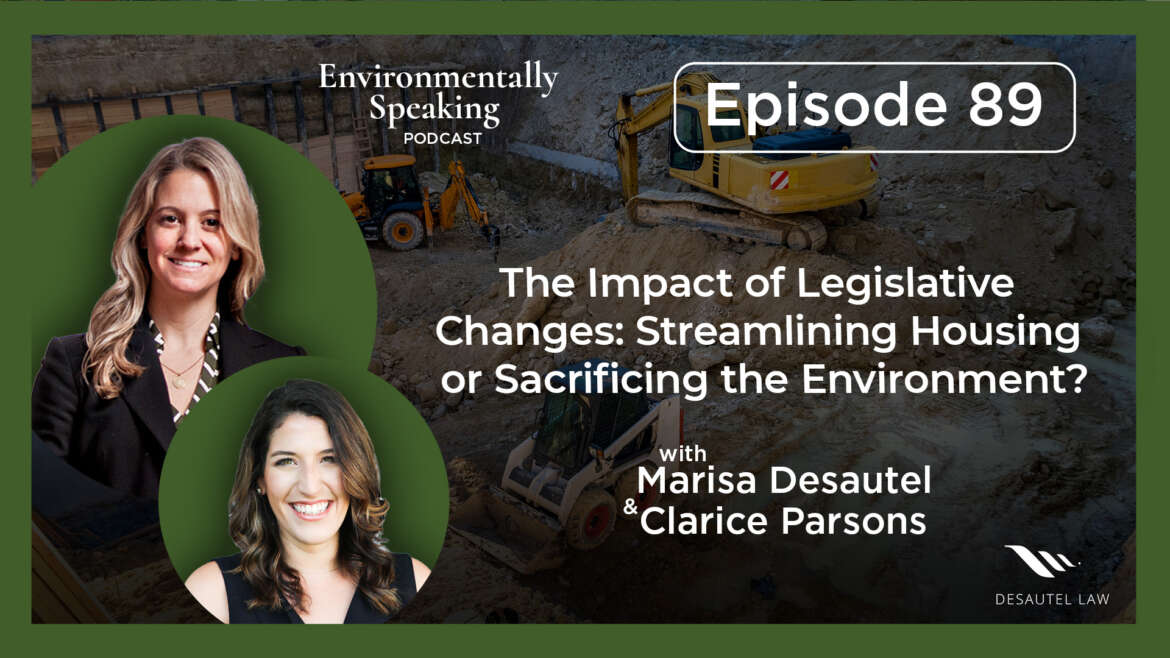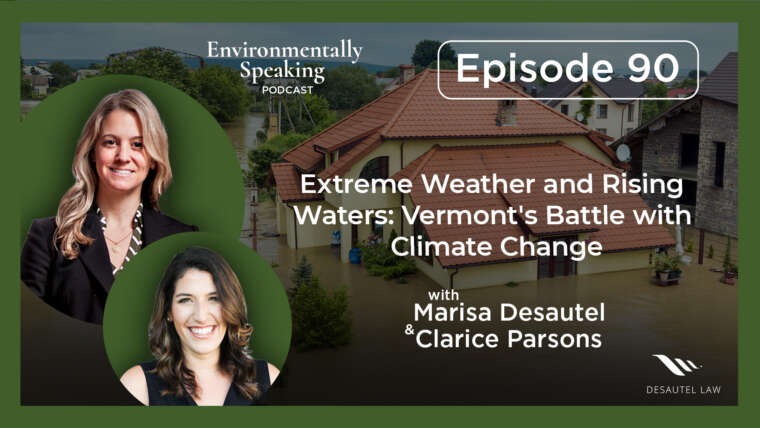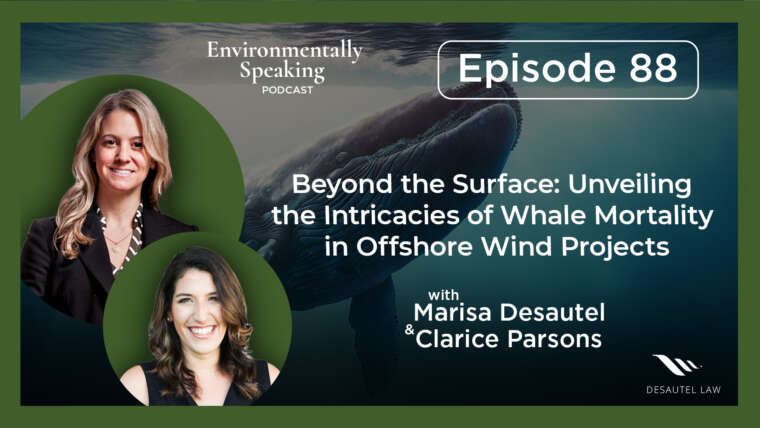Episode 89 Transcript: THE IMPACT OF LEGISLATIVE CHANGES: STREAMLINING HOUSING OR SACRIFICING THE ENVIRONMENT?
CLARICE: Hello. And welcome to this week’s episode of Environmentally Speaking.
MARISA: Hi, everybody. I’m Marisa Desautel, an environmental attorney here in Rhode Island.
CLARICE: And I’m Clarice coming in with questions, comments, topics. And this week’s topic is something I came across and I have lots of questions about so something a little bit nebulous, not a ton of answers this week.
MARISA: More Q than A?
CLARICE: Definitely more Q, lots and lots of Q.
MARISA: Okay.
CLARICE: It looks like this is regarding — and let me pull it up. I’ve already lost it.
MARISA: Well, and I like that you’re not quite sure what the topic is.
CLARICE: Yeah.
MARISA: It looks like we’re talking about —
CLARICE: I think. Listen, when I describe this podcast I do not say it’s two experts. It’s an expert and somebody to talk to. But we’re talking about the RI Senate Bill 1037A. And I read an article about this bill and this bill deals with the need and efforts to create affordable housing in Rhode Island. And the article I read from ecoRI.org talked about how — specifically the line that struck me was — this article calls out how — very dramatically in — apparently crossed out in red so picture that insane vision.
MARISA: Oh.
CLARICE: There will be no significant negative environmental impacts from the proposed development as shown on the final plan with all required conditions for approval.
MARISA: Okay. What’s your reaction?
CLARICE: Again, lots and lots of questions. The article goes on to talk about this balance between need for affordable housing and the constant need for access to affordable housing while still balancing, protecting our environment and protecting the spaces and how space is constantly being limited. And you’ve talked about this several times about how our resources are constantly becoming more and more finite and as we get older we’re becoming more and more aware of that. And I’m just — seeing that sentence of there will be no impact I just can’t help but think how. How could there not be an impact.
MARISA: Yeah.
CLARICE: The mere creation of more comes from the absence of something else. It can’t be made out of — it has to be made of something. You can’t make and not take away from something else.
MARISA: Yeah. Yeah.
CLARICE: While I think this article — I mean, I’m not a journalist. I don’t write because I’m bad at it, so I don’t. So I don’t want to knock the writer for this, but I found that this article was really interesting, but that big impactful sentence didn’t go anywhere.
[0:03:11] MARISA: Yeah.
CLARICE: And it left me with that big question of what do we do now. It posed this big question and I’m still left going, okay, now what.
MARISA: Yeah. Taking a step back for just a second, the Rhode Island 2023 legislative session ended at the beginning of July and one of the big initiatives and success stories that came out of the session relate to the dire situation in Rhode Island about folks not having enough access to low and moderate income housing which is a real problem.
CLARICE: Absolutely.
MARISA: And so the legislature endeavored to make some changes through revising a ton of state law to allow for more streamlined permitting, the use of commercial properties that are currently vacant and not being used to convert those into residential, but the senate bill that you’re referring to, this 1037 sub A — so the sub A means that there were many drafts besides the original that was proposed, so they worked on it for quite some time. And it’s always interesting to me when I see a state law that has nothing to do with the environment necessarily, yet it has an impact on environmental considerations.
I think as a general proposition everything that humans do has an impact on the environment, so I’m not surprised that a state law aimed at housing has an impact on the environment. And I, in previous episodes, have gotten on my soapbox and talked about how overpopulation is a major problem and land use without enough foresight to plan for the future is a problem and I think this is just another example of that issue. So with that as the backdrop, I think your question about how the language in this particular draft striking reference to environmental harm is an issue. I don’t know why you would get rid of that language.
CLARICE: It just doesn’t seem like it could be true.
MARISA: Yeah. Of course it’s not, so then why would it be stricken?
CLARICE: Exactly. And I wish there was more information as to the thought process. And I’m not saying this in a way where one of the two issues that we’re talking about here is, you know, more important or should be spoken about more.
[0:06:02] MARISA: Yeah.
CLARICE: Obviously affordable housing is a huge issue. I just looked it up. Apparently Rhode Island is the ninth most expensive state in the country.
MARISA: Yeah.
CLARICE: It looks like Massachusetts our neighbor is number three.
MARISA: Yeah.
CLARICE: It’s a major problem, I mean, both of which are equal, competing major problems. So, you know, what do you do when you’re stuck between that rock and a hard place. But I don’t know necessarily if striking one to focus on the other is going to make sense. It feels a bit lite procrastination. Can I kick this can down the road.
MARISA: Kick the can down the road, yeah. That’s exactly right. So I’m looking at the draft bill in front of me. That’s why I’m looking down here and not at you. Any idea where this language is in the draft because I’m not seeing it?
CLARICE: I don’t know. I wish I knew where it would have been —
MARISA: Yeah.
CLARICE: — because it looks like it was stricken. I couldn’t figure out where it would have even gone.
MARISA: Yeah. All right. Well, I can tell you that the goal of all of these legislative changes is to streamline processes. Whenever I hear that phrase, we’re going to streamline process, we’re going to get rid of the bureaucratic red tape, that just means less environmental protection. That’s all that means to me, so that is concerning. However, I did like the initiative of turning commercial properties that are just sitting there into residential and affordable housing. I think that’s a great idea.
CLARICE: Which is something that’s happening where I live really frequently.
MARISA: Oh, really?
CLARICE: Yeah.
MARISA: Do tell.
CLARICE: A lot of the old mills, the old Fall River mills —
MARISA: Oh, yeah. That’s right.
CLARICE: — that are able and safe to be converted have been, some of which are still under sort of — I guess the word I’m trying to use is chemical cleaning and decontamination to be safe to live in.
MARISA: Yeah. Remediation.
CLARICE: Remediation. Thank you. The ones that have gone through that process have been turned into some beautiful loft apartments.
MARISA: Yeah. They’re great. And are they considered affordable?
CLARICE: Some are affordable. Some are senior living. There’s been a whole range.
MARISA: Because I’ve looked at some of those apartments years and years ago and they are not affordable.
CLARICE: There’s a couple different options around.
MARISA: It’s like the opposite of affordable.
CLARICE: Yeah. Yeah. When it first started they were not affordable at all, but now they’ve grown. There’s a couple different senior communities that are specifically geared towards folks who are a bit older and living on a fixed income, so those are affordable. I know a lot of them are taking assistance vouchers and things like that to be more affordable, but there’s a range now just in Fall River.
[0:09:02] MARISA: Okay.
CLARICE: It’s a good option.
MARISA: I agree. I think it’s great.
CLARICE: It’s using space that’s already there so you’re not taking from something else and creating new development.
MARISA: Yeah.
CLARICE: And it’s getting used.
MARISA: Yeah.
CLARICE: I love that.
MARISA: So, I mean, that’s pretty much all I have to offer on this topic.
CLARICE: Yeah.
MARISA: It’s a very specific issue.
CLARICE: Lots of questions around it. And like I said, I don’t want one to be — you know, I don’t want to sit here and say one is more important than the other. I think both are important and both need addressing.
MARISA: But where do you draw that line.
CLARICE: Exactly. Where do you draw that line. And I will say I don’t think it’s drawing a red line through the phrase of, you know, there will be an impact to the environment. You have to acknowledge that.
MARISA: Yeah.
CLARICE: And, you know, hearing you say that they’re going to streamline process these and how you think that that’s going to have an environmental impact, when I hear that I almost hear that as sort of a panic response.
MARISA: What do you mean? From me?
CLARICE: No. No. No.
MARISA: Oh, because I am panicking over here.
CLARICE: We’re always panicking.
MARISA: Every day I’m like, what is happening.
CLARICE: We’re always panicking. When I hear somebody say, oh, we’re going to fast track this, or we’re going to streamline process these —
MARISA: Yeah. It’s not good.
CLARICE: — to me that always sounds like, oh, we’re doing something a little too late, or like we should have started this sooner.
MARISA: Yes. Yes. And we didn’t.
CLARICE: We’ve missed the boat, so now we have to do it faster.
MARISA: And with less responsibility.
CLARICE: Yes.
MARISA: Let’s just do it and we’ll worry about the consequences later.
CLARICE: Yeah. Something to look out for.
MARISA: Great.
CLARICE: Oh, listeners, do you have any ideas? Let us know. Can you solve this? Write in. Fix this, listeners.
MARISA: Please.
CLARICE: We are on the socials at Desautel Law on Instagram, Facebook, Twitter. You can watch our videos on YouTube. You can send us an e-mail at Help@DesautelESQ.com. Let us know what are your thoughts? What are your brainstorms? What are your reactions? We need help.
MARISA: We need lots of help.
CLARICE: Have a good one, everybody.
MARISA: Bye.




